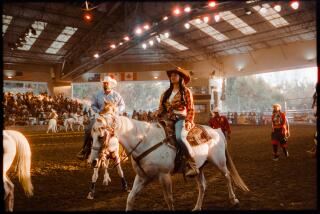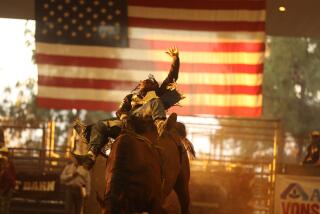Stabilizing Influence : Horsemanship Offers El Fig Riders a Respite From Inner-City Living
- Share via
Rico Evans was astride his brother-in-law’s horse Gentle, going at an easy gait on the greenbelt along South Broadway, when the young parolee approached and asked if he could ride.
“I told him sure, if he came over to 131st and Figueroa,” Evans recalled. When the parolee showed up, he told Evans that he had been a passenger in a car involved in a drive-by shooting and that he had just completed a two-year prison sentence.
“He said he didn’t want to go back to that old lifestyle, and I put him to work cleaning stables, showing him how to care for a horse,” Evans said. “He fell in love with Gentle, saved his money from odd jobs and wound up buying the horse.”
The young man has since completed his probation, bought a truck and stayed out of trouble, said Evans, a drug rehabilitation counselor who also teaches riding. “He attributes that to being around the stable,” Evans said.
Long before there were Crips or Bloods--or drive-by shootings, for that matter--in South-Central Los Angeles there was the gang over at the El Fig Stables--a magnet for plumbers and police officers, mechanics and engineers, carpenters and just plain cowboys since the 1950s.
“We’ve got brick masons, rubbish collectors, aerospace workers and security guards,” said Bert Martin, 65, a retired Army Command Sgt. Major who has stabled horses at El Fig for 19 years. “The bond here is horsemanship.”
Horses can be depended on, said Inglewood Mayor Edward Vincent, who stabled his horses at El Fig for 10 years and still stops by. “Horses take away the frustration of politics,” he said. “You know what a horse is going to do. In politics, a guy embraces you one day. The next day he stabs you in the back.”
El Fig is the place where former world champion bull rider Charlie Sampson, a native of nearby Watts, was introduced to rodeoing, and dozens of teen-agers still show up daily after school to muck stalls and exercise their animals.
Just as often called simply “the Hill,” El Fig takes its name from the intersection of El Segundo Boulevard and Figueroa Street. But a motorist could pass that corner daily without knowing that more than 2,000 head of horses call it home.
Until about five years ago, there was an El Fig riding stable where horses were available to rent. But the business closed after the owner died.
No signs mark the spot where the horses are stabled. The area appears covered in the functional, box-like buildings of light industry that have eaten up much of the former riding area. But a turn east from Figueroa at 131st Street leads to an alley cutting through junkyards heaped high with rusted out cars, trailers and other metallic odds and ends. The stables line the alley for about four city blocks.
*
“I was a bull rider for 25 years,” said C.B. (Sugar) Alexander, 52, huddled in a knot of horse owners around a fire barrel. “I put Charlie Sampson on his first bull. I rode bulls because my daddy rode bulls. All my life I had to compete with my daddy’s reputation. Everybody always said he was better than me.”
But Alexander, who turned to driving 18-wheelers after an injury ended his rodeo career in 1981, gets a beam in his eye when he talks about his inclusion in the 1986 book “Black Cowboys.” His daddy would have been proud.
The cowboys and cowgirls at El Fig show up regularly in parades, in horse shows or at schools where they introduce urban youngsters to horses. Come February, though, the amateur rodeo circuit gets under way, carrying on the tradition of Bill Pickett, the legendary black cowboy who invented bulldogging. Many of the riders are getting ready for the weekend events.
Wilber (Bobo) McDaniel, 14, a freshman at Paramount High School, has been practicing roping and bareback riding. He began riding only six months ago, but he looks like a seasoned veteran astride Evans’ roan appaloosa Too Sweet.
“I play basketball, and the coach yells a lot,” Wilber said. “Around the house, my mom gets upset. All of that is stress. But when I go riding, all of my feelings are in the horse. It releases stress for me. It’s just plain fun.”
His attitude is exactly what his mother, Vernell McDaniel, had hoped for.
“I wanted to make sure that my son would not become a victim of the violence in the city,” said McDaniel, 37, a Compton police officer for the past 11 years.
She remembers when her father brought her to the stables when she was a girl, and riding is now giving her and her son “the opportunity to experience some things about each other that I would never have been able to do had I not come up here.”
She knows she and her son are closer from “just the riding in the sunsets, the air, nature. The guys up here on the Hill have taken a special interest in me and my son. It’s like home to us. I feel more comfortable here than I do at home.”
McDaniel introduced her son to horses at a critical time, said Evans, an Army brat who began riding while attending a military academy in Kentucky. “He was at that age when gang activities were pulling at him and girls were pulling at him,” Evans said. “He was at that point in life where he was asking: ‘Which way do I go?’ Riding has been a wonderful strategy for them both.
“A plus at the stable has been our ability to reach out and start touching some of these inner-city kids, to turn them around.”
*
Michael Johnson remembers that as a child in Magnolia, Ark., he would run to a fence whenever he saw affluent white horsemen out riding their Tennessee Walkers. He would press his face against the slats “just so the horses could walk right in front of me.
“Never, ever in my life that I can remember as a child did a person who owned those horses ever stop and say: ‘Son, would you like to rub the horse?’--let alone ride the horse.”
That is when his prayer became a broken record: “Lord, let me have a horse.”
He now has a pair of what Evans calls the “finest Tennessee Walking horses at the stable.”
“Being black and growing up in South-Central Los Angeles, there was a lot of peer pressure and a lot of other alternative means for becoming involved in the wrong things,” said Johnson, 33, an operating maintenance engineer.
“Horses gave me an alternative to being a part of a gang, being a part of the hip crowd--the boys who want to go out on Friday and Saturday night and do things that don’t lead to a productive lifestyle.”
More to Read
Sign up for Essential California
The most important California stories and recommendations in your inbox every morning.
You may occasionally receive promotional content from the Los Angeles Times.










